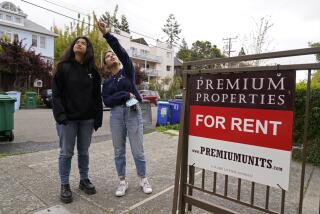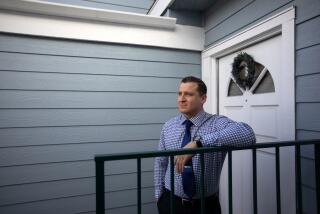Hong Kong Homeowners Squeezed by Price Slump
- Share via
HONG KONG — The two nastiest words for many Hong Kong residents might well be “negative equity.”
They describe Linda Chu’s situation. The 63-year-old retired pharmacist paid $282,000 in 1998 for an 800-square foot apartment that’s now worth just $167,000.
Many other Hong Kong homeowners are also squeezed, owing banks more money than they can hope to get by selling their property. The problem is that real estate values that soared in the 1990s came crashing down during the Asian economic crisis and never recovered.
The government recently announced plans to try to boost the market and, in turn, prices. It curtailed land sales for a year and said it will make middle-class buyers ineligible to buy subsidized housing.
But analysts and worried mortgage holders say it remains unclear how much or how soon that will help a market battered not only by a bursting bubble in the ‘90s but also by an economy that has been stagnant for some time.
Hong Kong’s unemployment hit a record 7.8% from May to July and the numbers have stayed stubbornly high, sapping people’s confidence in the territory’s ability to bounce back.
“I won’t expect much because our economy is still in a very bad shape,” Chu said. “I think it will take at least four to five years before we could see any improvement.”
A general view is that only economic recovery can rescue Hong Kong’s real estate market. But recovery has proven elusive for the past few years as the territory limps along, trying to reinvent itself despite little real expansion.
Critics say part of the problem was Hong Kong’s overdependence in the past on rising property prices to feed growth -- making the subsequent slump all the more painful.
Many people are now trapped in apartments they couldn’t afford to sell even if there were eager buyers.
Hong Kong’s plan to help the market -- criticized by some as a handout for rich developers -- might increase the number of property sales, but it also might do little for prices, said Adrian Ng, head of regional property at BNP Paribas Peregrine.
“It will influence the buyers psychologically. Some people have more confidence,” Ngan said. “In terms of prices, it probably will remain soft, at least in the next six or 12 months, because of ample supply. The demand has been picking up, but it’s still price-sensitive.”
Ngan predicted it will be 2005 before the government’s measures have a real impact.
Others note that the government has cut back on supply in the past with little success. In September 2001, for example, Hong Kong halted sales of subsidized apartments for almost a year without seeing much improvement in the market.
Clifford Lam, head of property research at investment bank Merrill Lynch, has a somewhat brighter forecast this time around, based largely on an economy showing early signs of growth.
“What hasn’t been there before is the economy recovering,” Lam said. “Unemployment rates are going down and deflation seems to be easing as well. The economy seems to be rebounding.”
The property market will probably never go “haywire” again as it did in the run-up to Hong Kong’s handover from British to Chinese sovereignty in 1997, but “there’s no reason it should be looking down,” Lam said.
Despite some predictions of a rebound, many ordinary buyers remain gloomy. Their lack of confidence can hinder the prospects of recovery as people who have money hoard rather than spend or invest.
That has contributed to more than four years of deflation -- prices falling due to lack of consumer demand -- which has held back the economy generally, and real estate in particular.
“I think the prices will continue to fall in the next three years because the market is now overstocked,” said Quentin Leung, 27, a computer engineer.
He took out a $209,000 mortgage on a small apartment in 1999, but now the property is valued at just $160,000.
“It’s hard for me -- now I can’t spend much money on movies or dinners in restaurants,” Leung said. “But I think owning a property is still a top priority for many Chinese. It’s still a better investment than putting cash in banks.”
More to Read
Inside the business of entertainment
The Wide Shot brings you news, analysis and insights on everything from streaming wars to production — and what it all means for the future.
You may occasionally receive promotional content from the Los Angeles Times.










